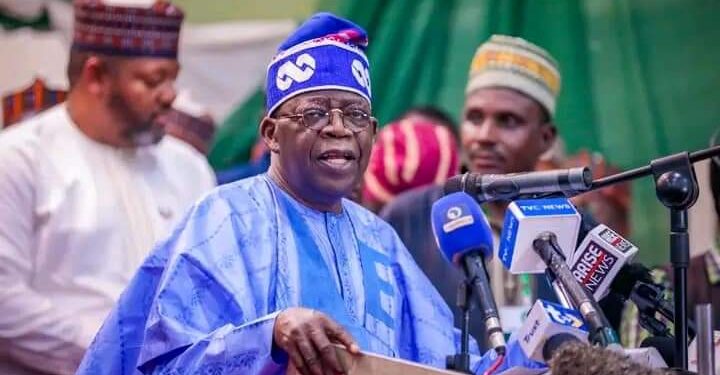By Bola BOLAWOLE
While he was visiting President Bola Ahmed Tinubu recently, the Nobel Laureate, Prof. Wole Soyinka, said he would give the president one year of grace before rating his performance in office. As would be expected, Tinubu and or Soyinka haters have read negative meanings into that. Soyinka, some have said, was only shying away from critically examining Tinubu’s performance so far. To others, it is a tacit admission by the Nobel Laureate that Tinubu has not done anything worthy of positive evaluation in his first six months in office.
Always, opinions would be varied on any issue; not to talk of an issue as sensitive as the governance of Nigeria in these challenging times. There is nothing wrong in giving someone in a new office ample time to settle down to learn the ropes before he can begin to deliver on deliverables. A child first learns to crawl, then walk before he can begin to run. The other side of the coin is that since Tinubu himself had promised to hit the ground running, there is nothing bad if he is dragged before the examiner after just six months in office. Morning, as they say, shows the day. A child that would be smart, the elders say, would begin to demonstrate traits of that from the beginning. Therefore, while we may not post definitive conclusions on Tinubu’s performance so far, it may be worth our while to judge what the future holds in stock using the indices of the past six months.
What has Tinubu achieved in six months? Has he ended the insurgency? Has insecurity become a thing of the past? Has kidnapping ceased all over the country and the people free to move from place to place without fear of molestation? Has banditry ceased and have farmers returned to the farm? Has terrorism ceased? Are people no longer being killed in their sleep by whoever? Are villages no longer being attacked, with hapless citizens hacked down and their properties razed? Sadly, all these dastardly acts still happen. They get reported now and again. The frequency has reduced but we still hear of them all the same.
The present crop of Service chiefs is said to be some of the very best since 1999 and they are leaving no stones unturned to end every act of insecurity that has given Nigerians trouble-filled days and sleepless nights. I wish them the very best! I also wish that we would put our food where our mouth is by giving security enough funds to prosecute the war against insecurity. It is one thing to vote money; it is another to release the money so voted; and to do so at the right time. And for the funds to be utilized for the appropriate purpose. No more bazaars, please! So let Tinubu and the armed forces know that while we salute their efforts so far, it is not yet “uhuru”
After insecurity comes the economy: has it improved in Tinubu’s six months in office? The answer that the majority of Nigerians will give here will be a resounding “NO” And we will not be able to blame them. Neither can we pretend not to know that Muhammadu Buhari left an economy that former CBN governor and now governor of Anambra state, Prof. Charles Soludo, described as a walking corpse. National Security Adviser, Nuhu Ribadu, has also described the economy Buhari left behind as comatose. It will take time and effort to fix it. This is a task that cannot but be Herculean.
Nevertheless, the removal of fuel subsidy in one fell swoop and the merger of the official and parallel exchange markets has further thrown the economy into a tailspin. Misery and poverty have deepened all over the country. The poor have been more viciously affected than the rich. The middle class, which is the bulwark of any thriving economy, has been pulverized, as it were. I am not sure there are many people who will give thumbs up to Tinubu on the twin issues of removal of fuel subsidy and devaluation of the Naira, even though it is widely accepted that subsidy had to go. All the three leading presidential candidates said they would remove subsidy but how and when have become the subject of controversy. Some have said Tinubu cheated Nigerians to one month of subsidy enjoyment; that subsidy was planned to end in June and not May. Some also say the removal should have been staggered and not removed in one fell swoop.
Be that as it may, the subsidy is gone; except that we hear rumours, now and again, that it might have returned through the back door. Government officials have denied this but the rumours are not relenting. With the end to subsidy has come quantum sums of money for the three tiers of government to share. Over one trillion Naira is available for sharing now. That is a plus, which is often conveniently ignored, but to what use are the three tiers of government putting this? Is it simply helping to fuel profligacy and corruption? How can the long-suffering Nigerian people who are the ones suffering the pangs of subsidy removal and devaluation of the Naira benefit from the largesse it has engendered?
For now, there is no evidence that the largesse is being extended to the poor. The so-called palliatives have palliated nothing; instead, it has provided another avenue for unscrupulous elements to get richer at the expense of the poor. This is where Labour and other unions should come in. Pressure must be mounted on the three tiers of government to ensure that the increased funds in their hands as a result of fuel subsidy removal is plowed back into ventures that lessen the pains of the people.
Another positive angle to subsidy removal is the renewed effort to repair the refineries. Reports, though exaggerated, have it that some progress has been made. Politics was added to the mix last week when we were made to rejoice too early that the Port Harcourt refinery was ready to begin to pump out fuel – only for us to learn later that it is not yet “uhuru”. Progress is being made – and we must give credit to the Tinubu administration for this – but we are not out of the woods yet.
Former President Muhammadu Buhari performed a political commissioning of the Dangote refinery before he left office. Six months after, they keep “posting us” as it were, concerning when that refinery will start to pump out fuel. More worrisome are reports that even when these refineries start pumping out fuel, the price of fuel will not necessarily plummet! Why, if I may ask? And what is the purpose of pumping billions of dollars into the refineries if it will not alleviate the suffering of the masses? Hear me and hear me well: The refineries must work this time around; and they must lead to a crash in the pump price of petrol, diesel, etc.! Or else, everyone involved should get ready to see the red eyes of Nigerians. There must be a limit to endurance.
In six months, has Tinubu demonstrated that he possesses the political will to fight corruption? The answer is blowing in the wind! Nigerians saluted the arrest and detention of ex-CBN governor, Godwin Emefiele. A fraction of the revelations coming out of the probe into Emefiele will cause a revolution in some other countries but Nigerians are minding their own business as if it does not concern them! But what of the others who looted this country blind? Will it soon be their own turn to face the music? The ex-EFCC boss was arrested; then released. What happened behind the scenes?
We hear that stolen money is being recovered from some people quietly. We need to know the details. Who is refunding what? The Buhari ministers who raped this country, what is Tinubu going to do about them? The Buhari family members who turned our common patrimony into their personal use, will they be allowed to go scot-free? Emefiele could not have performed the heist we read about daily all by himself: Who and where are his accomplices? Now, what of the NNPC? Why is everything quiet on that front? When will Tinubu order a probe into that behemoth? Will he not because Buhari was the Petroleum Minister and alarm will blow if he does? Or is it because Tinubu himself has stepped into Buhari’s shoes as Petroleum Minister?
Apart from the three important sectors mentioned above – security, economy and corruption – which were the platforms on which Tinubu’s All Progressives Congress campaigned for office and won election in 2015, one other critical sector that will determine the success or failure of Tinubu in the long run is restructuring. APC’s manifesto promised restructuring but Buhari reneged once he got into office. From Tinubu, mum has been the word so far on restructuring. Six months may be too short a time to make a definitive pronouncement on what this portends.
But be it known all the same that this country must be restructured for it to work. In the final analysis, all the panel-beating and papering over of the cracks that Tinubu or anyone else may do will not suffice. At best, it will only postpone the evil day and make the crashing of the house more calamitous when, eventually, it happens. Another six months will soon be around the corner and Soyinka will be ready with his own verdict. If it will not be damning, then, Tinubu must do something that gladdens the heart of the majority of Nigerians on the four issues of insecurity, economy, corruption, and restructuring. The earlier, the better!
* Former Editor of PUNCH newspapers, Chairman of its Editorial Board and Deputy Editor-in-Chief, BOLAWOLE was also Managing Director/Editor-in-Chief of THE WESTERNER newsmagazine. He writes the ON THE LORD’S DAY column in the SUNDAY TRIBUNE and TREASURES column in NEW TELEGRAPH newspapers on Wednesdays. He is also a public affairs analyst on radio and television.
[email protected] 0807 552 5533















